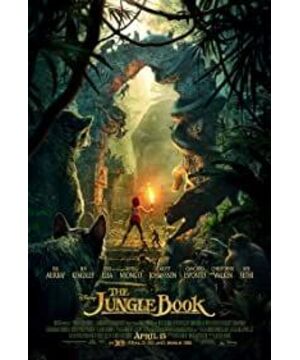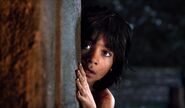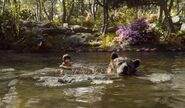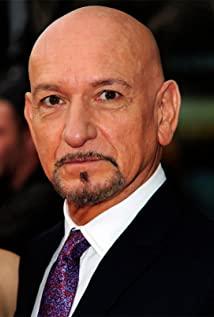The movie is adapted from a classic, I haven't seen it, and I can't compare it, I can only evaluate this movie as the only text. The film tells the story of a child raised by wolves and leopards, whose life is threatened by a tiger who dominates the forest. In order to protect the wolves from harm, Ren-Child embarked on a journey back to the human world. During the journey, danger and luck coexisted, and Ren-Child's cognition of his identity also changed during the journey. What identity will he ultimately choose, human or beast? This is a process of identity, a process of exploring the relationship between humans and animals, and a process of feeling nature. Humans and children fluctuate between the two identities of animals and humans, and animals fear, use, hate, and love and protect human and children. Fear, use and hatred are all due to the identity of humans as children, because humans have something that animals do not have. This is the progress of civilization for humans, but it is indeed a threat to the survival of animals living in the forest. Because unlike other beasts, because of the detection and use of civilization, human children are excluded and even face this danger. But the wolves and leopards who raised him since childhood have always regarded him as the same kind, stripping away the coat of civilization, what is the difference between humans and animals? not at all. That peeling skin, blacks, whites, yellows, Arabs. . . What's the difference? I didn't
see too many things that the movie wanted to express from the plot and casting, people and nature, people and animals, identity, race. The only human character is an Indian kid, and the movie does have a kid who looks Indian. This choice of staying true to the original is rather abrupt in the context of today's whitening of Asian characters. Scarlett Johansson (voicing python in this film) plays the Asian-American sapient in Ghost in the Shell - the white man plays the sapient; the savage (human child) finds an Asian-looking American instead act. The film itself, which expresses equality through the relationship between people, children and animals, has become a testament to the discrimination against Asians in the Hollywood film industry.
The film's view of the relationship between humans and nature and animals also appears contradictory. Humans who master civilization are the greatest harm to the animal world, and the existence of human children seems to provide a reasonable solution to this problem. Use civilization to adapt to the rules of the beast. The happy ending at the end (spoiler here) also confirms the way the film is meant to express harmony. But this harmony was achieved after irreparable damage to the entire animal population, with humans still in danger. This harmony itself is a kind of aggression and assimilation of a higher civilization to a lower civilization. It is not that animals assimilate human children, even though human children grow up in the animal kingdom; it is that human children conquer animals and nature with civilization. A film with equality, environmental protection, and identity as the theme implies hypocrisy and arrogance. Before the existence of man and child, nature was harmonious; the existence of man and child brought civilization and nature itself. Some aspects of this movie actually express the same theme as "The Revenant", race. But the latter pays tribute to the Indians and reflects on history; while this film beautifies the invaders, revealing the invincibility of advanced civilization everywhere. Compared with the same animal theme, which belongs to Disney's "Zootopia", what this film lacks is reflection and introspection.
The film is not only chaotic but also rushed. You can see it from the soundtrack. The soundtrack at the beginning of the film feels out of place, which culminates in the first episode. It bluntly added elements of musicals, singing for the sake of singing. The whole atmosphere became weird. The entire film ends in a decidedly quirky and slightly quirky atmosphere.
A good story, played by an ambitious director and Disney into a negative teaching material, a waste of money and the voice of Scarlett Johansson.
View more about The Jungle Book reviews











